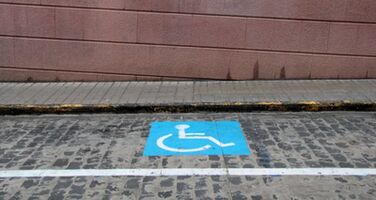
How Chronic Pain Sufferers Can Benefit From Having A Disabled Parking Permit
Are you a chronic pain sufferer? Do you find it difficult to walk or stand for extended periods of time? If so, you may want to consider getting a disabled parking permit. Not only can a disabled parking permit make your life easier, but it can also provide you with a sense of independence and freedom. In this article, we will discuss how chronic pain sufferers can benefit from having a disabled parking sign.
Causes of Chronic Pain
Chronic pain is a complex condition that can be caused by a variety of factors. It is generally defined as pain that lasts for 12 weeks or longer, even after the underlying cause has been treated or healed. Here are some of the most common causes of chronic pain:
Injuries and Trauma
Injuries and trauma can cause chronic pain, especially if they are not treated properly or if there are complications. Examples include broken bones, nerve damage, and soft tissue injuries.
Medical Conditions
Certain medical conditions can lead to chronic pain, including arthritis, fibromyalgia, and neuropathy. These conditions can cause inflammation, nerve damage, and other issues that result in ongoing pain.
Surgery
Surgery can also be a cause of chronic pain, especially if there are complications or if the surgery was performed on a sensitive area of the body.
Infections
Infections can cause chronic pain, especially if they affect the nervous system. Examples include shingles, Lyme disease, and HIV.
Lifestyle Factors
Certain lifestyle factors can contribute to chronic pain, including poor posture, lack of exercise, and stress. These factors can lead to muscle tension, inflammation, and other issues that result in ongoing pain.
Genetics
Genetics can play a role in chronic pain, as some people are more susceptible to pain than others. This can be due to differences in pain sensitivity, pain threshold, and other factors.
Common Types of Chronic Pain
Chronic pain can manifest in many different forms, depending on the underlying cause. Here are some of the most common types of chronic pain:
Back Pain
Back pain is one of the most common types of chronic pain. It can be caused by injuries, medical conditions, or lifestyle factors.
Headaches
Headaches can be a chronic condition for some people, especially if they suffer from migraines or tension headaches.
Joint Pain
Joint pain is a common symptom of arthritis, which is a medical condition that can cause inflammation in the joints.
Nerve Pain
Nerve pain can be caused by a variety of factors, including nerve damage, neuropathy, and shingles.
Pelvic Pain
Pelvic pain can be caused by medical conditions such as endometriosis, fibroids, and pelvic inflammatory disease.
Muscle Pain
Muscle pain can be caused by injuries, overuse, or medical conditions such as fibromyalgia.
What Is a Disabled Parking Permit?
A disabled parking permit is a special parking placard or license plate that allows individuals with disabilities to park in designated handicap parking spaces. These spaces are typically located closer to the entrance of a building or establishment and are wider than regular parking spaces to accommodate wheelchair ramps.
How Do You Qualify for a Disabled Parking Permit?
To qualify for a disabled parking sign, you must have a disability that limits your mobility. This includes chronic pain conditions such as arthritis, fibromyalgia, or back pain. You will need to provide medical documentation from your doctor that states your condition and the extent of your disability. This documentation will be reviewed by the Department of Motor Vehicles (DMV) or a similar agency in your state.
Can I Get A Disabled Parking Permit For Chronic Pain?
Many people with chronic pain wonder if they are eligible for a disabled parking cards . The answer is yes, in many cases. Disabled parking cards are typically issued to individuals who have mobility impairments that limit their ability to walk or stand for extended periods of time. Chronic pain can often fall under this category, especially if it affects the legs, hips, or back.
What Are the Benefits of Having a Disabled Parking Permit?
Benefits of Having a Disabled Parking Permit for Chronic Pain
Having a disabled parking card can provide many benefits for individuals with chronic pain. Here are some of the most significant benefits:
1. Accessibility
With a disabled parking card , you will have access to designated handicap parking spaces that are closer to the entrance of a building or establishment. This means you won't have to walk as far, which can be especially beneficial if you experience pain or discomfort while walking.
2. Convenience
Handicap parking spaces are typically wider than regular parking spaces, which means you will have more room to maneuver and get in and out of your vehicle. This can be especially beneficial if you use a mobility aid such as a wheelchair or walker.
3. Independence
A disabled parking sign can provide you with a sense of independence and freedom. You won't have to rely on others to help you get in and out of your vehicle, and you can come and go as you please without worrying about accessibility issues.
4. Reduced Stress
Parking can be a major source of stress, especially if you have a disability that limits your mobility. With a disabled parking permit, you won't have to worry about finding a parking spot or navigating a crowded parking lot.
5. Reduced Walking Distance
Disabled parking spaces are typically located closer to building entrances than standard parking spaces. This can reduce the amount of walking required to reach your destination, which can be especially beneficial if you experience pain when walking or standing for extended periods of time.
6. Reserved Parking Spaces
Disabled parking spaces are reserved for individuals with mobility impairments, which means you are more likely to find a parking spot close to your destination. This can be especially helpful if you need to attend medical appointments, go grocery shopping, or run other errands.
7. Reduced Pain and Fatigue
By reducing the amount of walking required to reach your destination, a disabled parking permit can help reduce pain and fatigue associated with chronic pain. This can improve your overall quality of life and make it easier to complete daily activities.
How to Apply for a Disabled Parking
The process for applying for a disabled parking varies depending on your location. In general, you will need to fill out an application and provide documentation from a healthcare provider that confirms your condition and the extent of your mobility impairment. This documentation may include medical records, test results, and a letter from your doctor. You can get started with HandicapMD to assist you.
Once you have submitted your application and supporting documentation, it will be reviewed by the appropriate agency or department. If you are approved, you will receive a disabled parking tag that you can display in your vehicle when parked in designated disabled parking spaces.
How Long Is a Disabled Parking Permit Valid?
The validity of a disabled parking tag varies by state. In most states, a disabled parking is valid for 2-3 years. You will need to renew your tag before it expires if you wish to continue using it.
How to Use a Disabled Parking
When using a disabled parking tag , you will need to display it on your vehicle's dashboard or hang it from your rearview mirror. Make sure the tag is visible and not obstructed by anything. You should also make sure you park only in designated handicap parking spaces.
If you are living with chronic pain, you may be eligible for a disabled parking . The process for applying varies depending on your location, but typically involves submitting an application and supporting documentation from your healthcare provider. Benefits of having a disabled parking card for chronic pain include reduced walking distance, reserved parking spaces, and reduced pain and fatigue. If you think you may be eligible, talk to your healthcare provider about the application process in your area.
FAQs
Q1. Can I use my disabled parking permit in other states?
Yes, you can use your disabled parking sign in other states. However, you should familiarize yourself with the parking laws and regulations of the state you are visiting to avoid any issues.
Q2. Can I let someone else use my disabled parking tag?
No, you cannot let someone else use your disabled parking sign. It is only intended for the use of the individual to whom it is issued. Allowing someone else to use your tagis considered fraud and may result in fines or legal penalties.
Q3. What if someone is parked in a handicap parking space without a tag?
If you see someone parked in a handicap parking space without a tag, you can report it to the authorities. Depending on the state, this may be done by calling a hotline or contacting a local law enforcement agency.
Q4. What if I lose my disabled parking tag?
If you lose your disabled parking card, you will need to contact your state's DMV or a similar agency to request a replacement. You may need to provide documentation to prove that you are the owner of the permit.
Q5. Can I use my disabled parking permit if I am not driving?
Yes, you can use your disabled parking signeven if you are not driving. However, you should make sure that the driver of the vehicle is authorized to use the card and that the card is displayed properly.
Q6. Can I use my disabled parking permit in private parking lots?
The use of disabled parking placards in private parking lots is regulated by the Americans with Disabilities Act (ADA). Private businesses are required to provide accessible parking spaces for customers with disabilities, but they may not be required to recognize disabled parking signs. It is best to check with the business before using your disabled parking sign in a private parking lot.
Conclusion
If you are a chronic pain sufferer, a disabled parking can provide you with many benefits. It can make your life easier, provide you with a sense of independence and freedom, and reduce stress. To apply for a disabled parking placard, you will need to provide medical documentation from your doctor and contact your state's DMV or a similar agency. Once you have your placard, make sure to use it properly and only park in designated handicap parking spaces.
By having a disabled parking, you can enjoy greater accessibility, convenience, independence, and reduced stress. It is important to remember that the placard is intended only for the individual to whom it is issued, and allowing someone else to use it is considered fraud. So, if you are a chronic pain sufferer, consider applying for a disabled parking permit and enjoy the benefits it provides.
.png)






